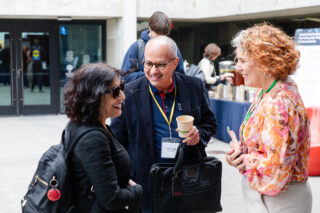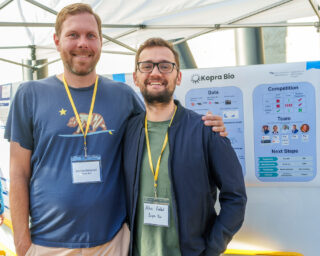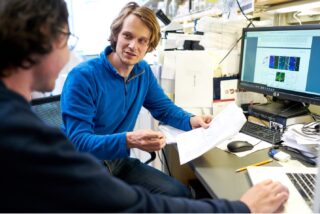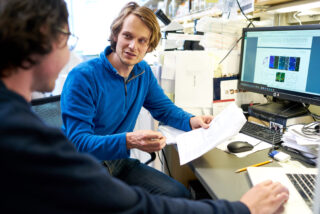QB3 Awarded $1.8 Million Multi-Campus UCOP Grant to Explore Autism Spectrum Disorder Using 3D Brain Organoid Models

By Niki Borghei. Learn more about QB3’s Collaborative Research initiative here.
On December 5, 2024, QB3 was awarded a $1.8 million “Multicampus Research Programs and Initiatives” (MRPI) grant by the University of California’s Office of the President to explore the origins of autism spectrum disorder (ASD). QB3 will use the funds to support researchers at UC Berkeley, UCSF, and UC Santa Cruz who will combine 3D “neural organoid” models, clinical imaging, and medical data from patients to identify clinically relevant autism patterns in the lab. These patterns can then be used to discover drugs to treat ASD, and arrest or revert its occurrence.
“With this project, we hope to combine brain organoid models with real patient data. This should give us more insight into the genetic basis of ASD. We are grateful to UCOP for supporting cross-campus collaborations,” says Helen Bateup, an associate professor of neuroscience at UC Berkeley and lead PI on the grant. The team includes Elliott Sherr, a professor of neurology and pediatrics at UCSF, and, at UC Santa Cruz, Sofie Salama, acting professor of molecular, cellular and developmental biology; Mircea Teodorescu, associate professor of electrical and computer engineering; and Mohammed Mostajo-Radji, an assistant research scientist. Salama, Teodorescu, and Mostajo-Radji are members of the “Braingeneers” group, a team devoted to studying brain organoids.
One in 22 children in California has ASD, and the number of patients diagnosed with this disorder is steadily rising. Symptoms such as learning difficulties, social anxiety, repetitive and restricted behaviors, and sensitivity to light and sound can range from mild to severe. Yet there is no known cure. The main challenge for researchers is that there are over one hundred genes associated with ASD, and scientists have yet to discover what exact pathways in the cell are causing the disease. One exciting breakthrough is the creation of 3D brain models, called “brain organoids”, made from patient cells. These brain models allow scientists to explore how ASD affects brain development and function in ways they couldn’t before.
“We’re hopeful that the critical insights we uncover could lead to better treatments and, ultimately, help improve the lives of people living with ASD,” says QB3 Grants Coordinator Lise Barbé, who assisted the scientists in conceiving the research and applying for the grant.
The MRPI grant complements a $12.3 million award that the California Institute for Regenerative Medicine made to QB3 in September. While most labs may only be able to investigate one gene at a time, the CIRM grant will support researchers in investigating 7 of the more common genes. The MRPI grant enables UC scientists to study 3 additional genes that are highly prevalent in ASD patients. The combined support from both grants will allow researchers to study a wider variety of ASD-linked genes and create more robust, clinically relevant brain models.
“The goal of our collaborative research initiative is to bring together scientists across UC campuses to achieve more together than they could individually, in addressing major health challenges such as ASD,” said QB3 Director David Schaffer, a UC Berkeley professor of chemical and biomolecular engineering whose research has spun off 8 companies developing therapeutics or technologies to deliver them precisely. “Ultimately our goal is to get medicines to patients, and discoveries made in this UCOP-supported research will be fully supported by QB3 translational programs should they have commercial potential.”











